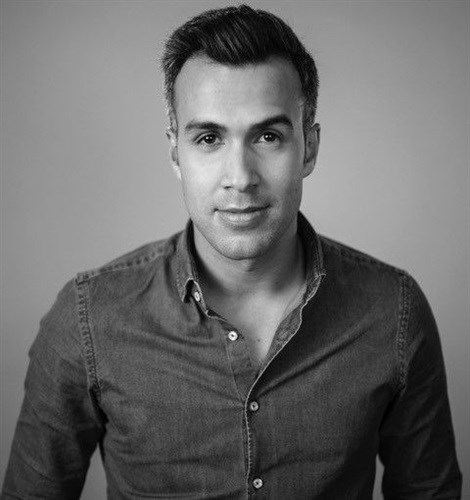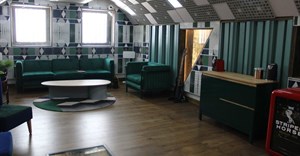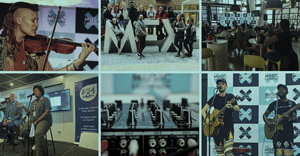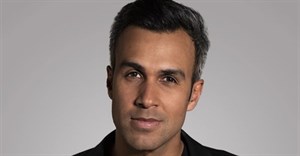Trending




 Does anyone know what content is any more?Justine Drake
Does anyone know what content is any more?Justine Drake
Loeries2017: Building the new creative economy at the speed of thought

I interviewed Fort CEO Shukri Toefy to find out what one could expect to learn from his masterclass on ‘Building at the speed of thought: the new creative economy’, where he’ll be sharing insights into trends and the changing value chain of the new creative economy.
We need to wake up from our slumber of ignorance around where we are able to compete on a global level and we need to take advantage of the digital platforms that allow us to be able to contribute in real time. People should realise that we really need to build at the speed of thought and we need to act on our good ideas and act on them quickly.Everyone from mid- to senior-level creatives, marketing managers, managing directors, CEOs and educators are encouraged to attend.
 What is your involvement in the Loeries this year?
What is your involvement in the Loeries this year?
I will be doing a masterclass as part of creative week, titled “Building at the speed of thought: the new creative economy”. Our team will also be in attendance as we have submitted and are finalists for our work.
 In this year’s Fort masterclass, the key topic of discussion is going to be around the new creative economy. What do you mean by the creative economy?
In this year’s Fort masterclass, the key topic of discussion is going to be around the new creative economy. What do you mean by the creative economy?
The idea of a creative economy is quite a new term. I think we have always understood that there are creative industries such as music, art, fashion, advertising, communication and theatre that make up the creative industry. I think this idea of a new creative economy foregrounds the fact that creative industries contributions to GDPs and economic activity on the whole.
We are also living in a period that is commonly termed as the fourth industrial revolution, where there has been an end of a commodity based economy and the rise of an information narrative based economy, and as such the creative economy and creative industries play a more pivotal role in economies, not only in South Africa and Africa but around the world. It is therefore important to unpack the creative economy and have a closer look at what opportunities exist for people who work within the creative economy as well as people who work in and around it.
 Comment on the state of the creative economy in South Africa, Africa and the Middle East.
Comment on the state of the creative economy in South Africa, Africa and the Middle East.
The creative economy in South Africa, Africa and the Middle East contribute greatly to the national narratives of each of the respective countries within these regions. I think they do a good job in supporting and building cultural narratives that can not only drive the economic imperatives but also push social agendas and change the way people think.
On the whole, there have been a lot of affirmations and accolades that have gone into the success of industries within the creative economy in South Africa, Africa and the Middle East and there is growing affirmation of that.
However, I think that there needs to be more importance put on the creative economy both in public and private sectors. We need to invest in creativity. We need to realise that it is in fact the creative industries that are going to drive change and innovation in our countries and that not only maths and science will shape the future, but actually creative industries because that’s where we need to be competitive and able to build dialogues and new narratives.
Quite importantly and something I deal with quite extensively in the masterclass is the inequality of many industries in South Africa, but particularly the creative economy, and that is that there needs to be a decolonisation of the creative economy. Far too many companies within the creative economy are foreign owned and as such profits and dividends flow offshore and don’t continue to churn within the creative economy within South Africa, Africa and the Middle East. So there is an opportunity for us to look at ownership patterns, looking at investing in companies to allow them to remain locally owned and not having to be sold out to European and American companies.
We also need to look the bias that people have towards Western and European influences around the way in which we approach things within the creative economy. We need to see ourselves not as followers and not over-valuing what happens abroad, but actually taking ownership and taking pride in the narratives that we build and start to dictate to the rest of the world, and start to lead narratives within the creative economy.
There are a number of examples of this and it’s a time for us to celebrate the successes that have occurred within the creative economy, within South Africa, Africa and the Middle East, but also to look at ways, practical ways, where we can start to support and foster growth within the creative economies.
 How is advertising shaping society across these regions?
How is advertising shaping society across these regions?
Advertising is a noble profession. The ability to sell and communicate key messages for companies around products and services and to deliver messages to communities and audiences is an intrinsic part of how we develop, innovate and move forward.
Advertising also needs to see itself as a really important part of turning the economic wheel of an economy and of a region. More than that, advertising and people working within advertising and communication industries need to realise that they have a role to play in shaping the way that people think about certain topics and issues. We play an important role in a similar way to how professtionals in the media industry or important religious figures do in shaping the sentiments and convictions of people and the way people think about things, the way they think about themselves, their communities, the way we start to debunk things and tackle social ills and difficulties.
Advertisers need to see and use their power not only to sell products but to actually see how this fits into a larger and economic and social eco system.
 The key takeout?
The key takeout?
There needs to be an awareness of the importance of creative industries within the creative economy and we need to stand together and lobby for support so that people know the importance that this will play in economies and social fabrics going forward. People will come out with some practical examples of how we can shape our existing businesses and economic eco-clusters and be able to change that and find a more important equitable way of doing business within the creative economy.
I will go through some examples of collaborations of how we can use our African humanism as a compass to where we are going while taking advantage of technological platforms that are available to us as a result of the fourth industrial revolution and a more digitized world.
 Tell us a bit about Fort Review, and why you’re adding video?
Tell us a bit about Fort Review, and why you’re adding video?
Fort Review is Fort’s leadership platform contributed and written by our staff and our clients and our suppliers – people who are part of the value chain within the community in which we work.
It is a really important platform for some of the quieter voices in the boardroom to be heard. It is very often the CEOs, chief creative officers and clients that get heard. We deal with interesting topics such as gender equality, patriarchy, transformation and diversity in advertising and these are often difficult topics and issues to deal with within a normal working environment.
The reason that we are adding video is because we like to be a self-fulfilling prophecy of saying how can we actually speak to young people. We know that by 2020, 80% of content consumed by people will be video and we realise we need to take advantage of the fact that we have these content creation capabilities and make sure we can reach a wider audience. An audience that would perhaps not be inclined to read an article or a book on trends, thoughts and analysis, but rather be part of the conversation and dialogue.
It also brings to life some of these amazing characters that have contributed to this year’s Fort Review publications and I really think that it will hopefully be something to spread more widely across South Africa, the continent and hopefully the Middle East in the coming year.
 Apparently, you’re going to be doing a few sneak peeks during the masterclass. When do these go live?
Apparently, you’re going to be doing a few sneak peeks during the masterclass. When do these go live?
We are going to be looking at six videos within the video series and we will be using them as discussion points to enable more interactivity between the audience and myself.
We will be discussing things like customer loyalty, this hype beast sort of community and mentality, personal branding, erotic capital and gender equality, as well as black excellence and the black voice in advertising. So some really interesting topics that I hope will give people an opportunity to interact not just with me as the facilitator, but across the room with everyone else.
We will be launching and going live at the Fort Review event in October, so keep an ear and eye out for more information to come. At the event we will have panel discussions around the various topics covered to allow people to interact and really interrogate some of the authors.
 Why are you excited/proud of this?
Why are you excited/proud of this?
I’m really excited and proud of the Fort Review project because Fort gives people a platform to be heard and express themselves. It is a highly creative platform, but more than that it gives a wider audience and a wider community of people an opportunity to be inspired and to learn from their own African peers.
Far too often it’s only the ‘Advertising Age’ and other international publications like ‘Marketing Week’ and things like that that we look to for inspiration and for ways to inspire us, and I think this is an opportunity to be inspired by our own people and to be contributing to a dialogue around issues that affect us as South Africans and Africans.
It is going to be an important part of contributing and elevating the need for creative industries to contribute more meaningfully to the creative economy and the greater economy.
 What’s the bottom line?
What’s the bottom line?
In summary people who work within the creative industries need to stand up and take responsibility for the role that they play in shaping their community’s national and global dialogues. They need to take responsibility for the role that they play within the new creative economy and for the role that they can play in tackling some of the bigger issues around a more equitable social landscape for creativity in Africa and the Middle East. We need to wake up from our slumber of ignorance around where we are able to compete on a global level and we need to take advantage of the digital platforms that allow us to be able to contribute in real time. People should realise that we really need to build at the speed of thought and we need to act on our good ideas and act on them quickly. We are in an economy and world that moves very quickly and far too often we sit and debate these topics and issues, but we need to stand up and do something about them immediately using our resources, our companies and our own abilities to shape where we’re going as a creative economy.
The masterclasses are currently under way at the Southern Sun Elangeni Hotel in Durban. For more info on these, go to Loeries.com.










